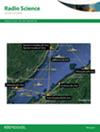Secrecy sum rate maximization of RIS assisted downlink NOMA system
IF 1.5
4区 地球科学
Q3 ASTRONOMY & ASTROPHYSICS
引用次数: 0
Abstract
In this paper, a method is proposed to improve the strongest user's channel gain and thus enhance the system secrecy sum rate (SSR) of the Non-orthogonal multiple access (NOMA) system using a reconfigurable intelligent surface (RIS). Based on the observation that the decoding process of NOMA system utilizes the power allocation differences among multiple users and the SSR largely depends on the strongest user's channel gain, an optimal power allocation optimization problem is constructed under quality of service (QoS) and total power constraints. Then a low-complexity relaxation based algorithm is proposed to improve the channel gain of the strongest user by optimizing the RIS phase, thereby enhancing the SSR of the system. The final simulation results show that the proposed method not only maintains good performance but also reduces computational complexity by about 2 dB.RIS辅助下行NOMA系统的保密和速率最大化
本文提出了一种利用可重构智能面(RIS)提高非正交多址(NOMA)系统中最强用户信道增益从而提高系统保密和率(SSR)的方法。基于观察到NOMA系统的解码过程利用了多个用户之间的功率分配差异,而SSR在很大程度上取决于最强用户的信道增益,构造了服务质量(QoS)和总功率约束下的最优功率分配优化问题。然后提出了一种基于低复杂度松弛的算法,通过优化RIS相位来提高最强用户的信道增益,从而增强系统的SSR。最后的仿真结果表明,该方法不仅保持了良好的性能,而且将计算复杂度降低了约2 dB。
本文章由计算机程序翻译,如有差异,请以英文原文为准。
求助全文
约1分钟内获得全文
求助全文
来源期刊

Radio Science
工程技术-地球化学与地球物理
CiteScore
3.30
自引率
12.50%
发文量
112
审稿时长
1 months
期刊介绍:
Radio Science (RDS) publishes original scientific contributions on radio-frequency electromagnetic-propagation and its applications. Contributions covering measurement, modelling, prediction and forecasting techniques pertinent to fields and waves - including antennas, signals and systems, the terrestrial and space environment and radio propagation problems in radio astronomy - are welcome. Contributions may address propagation through, interaction with, and remote sensing of structures, geophysical media, plasmas, and materials, as well as the application of radio frequency electromagnetic techniques to remote sensing of the Earth and other bodies in the solar system.
 求助内容:
求助内容: 应助结果提醒方式:
应助结果提醒方式:


